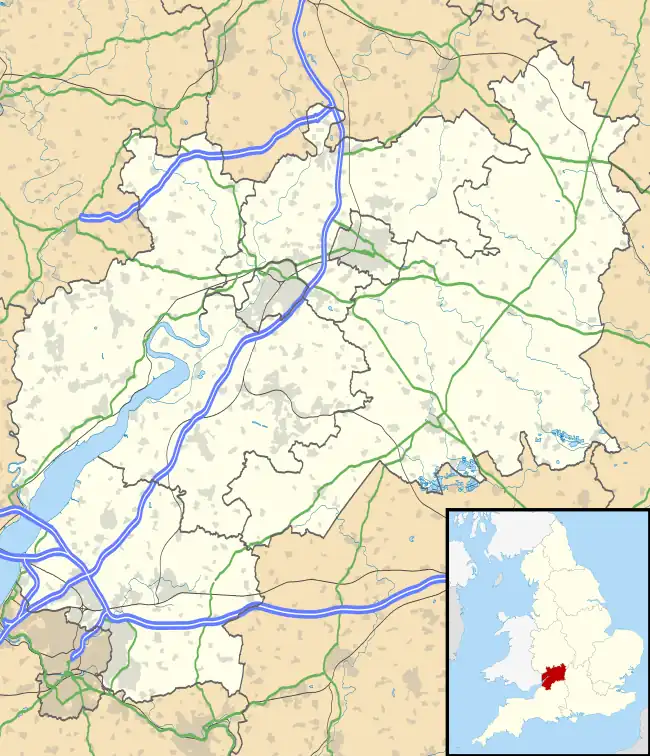Corn Hall, Cirencester
The Corn Hall is a commercial building in the Market Place, Cirencester, Gloucestershire, England. The structure, which is used as a shopping arcade and community events venue, is a Grade II listed building.[1]
| Corn Hall, Cirencester | |
|---|---|
.jpg.webp) Corn Hall, Cirencester | |
| Location | Market Place, Cirencester |
| Coordinates | 51.7169°N 1.9670°W |
| Built | 1863 |
| Architect | James Medland and Alfred Maberly |
| Architectural style(s) | Italianate style |
Listed Building – Grade II | |
| Official name | Corn Hall Buildings |
| Designated | 23 July 1971 |
| Reference no. | 1187501 |
 Shown in Gloucestershire | |
History
In the mid-19th century, a group of local businessmen decided to form a private company, known as the "Corn Hall Company", to finance and commission a corn exchange for the town. The site they selected, on the south side of the Market Place, was occupied by the Boothall, where wool trading had been conducted since the 16th century.[2][3][4] The directors secured a 500-year lease over the site from the owner, Henry Bathurst, 4th Earl Bathurst, whose seat was at Cirencester Park.[5]
The building was designed by James Medland and Alfred Maberly in the Italianate style, built in ashlar stone and was completed in 1863. The design involved a symmetrical main frontage of five bays facing onto the Market Place. The central bay featured a segmentally-headed opening with a hood mould and a keystone flanked by short Corinthian order pilasters and brackets supporting a cornice and a wrought iron balcony. The other bays on the ground floor were fenestrated by segmentally-headed tri-partite windows with hood moulds and keystones, while the first floor was fenestrated by round-headed sash windows flanked by pilasters supporting architraves and keystones, and the second floor was fenestrated by segmentally-headed sash windows with architraves and keystones. The heads of the first floor windows contained stone carvings by the sculptor, James Forsyth, depicting musical instruments, a ship's anchor, a wheatsheaf, fine arts and a phoenix. At roof level, there was a frieze, a modillioned cornice and a balustraded parapet. Internally, the principal room was the main hall, which was accessed down an angled corridor to the left from the rear of the entrance hall.[1]
The use of the building as a corn exchange declined significantly in the wake of the Great Depression of British Agriculture in the late 19th century.[6] It was subsequently used as a community events venue and hosted lectures by the local school of art as well as performances by visiting amateur and professional theatrical companies.[7] It was used as a reception centre for evacuees, before hosted a boxing match to raise money for Wings for Victory Week in May 1943, during the Second World War.[8]
The building was acquired by Cirencester Urban District Council in 1951 and the main hall then became the local civil defence headquarters for the town, while the second floor was used as a club for the local branch of the Royal Air Forces Association.[9] It went on to become a popular concert venue: the locally-born drummer, Cozy Powell, performed there with rock band, The Corals, on a weekly basis in the mid-1960s.[10]
In 1975, the building hosted the first of a series of regular craftsman's markets selling handmade goods to tourists. It was acquired by a developer, Wildmoor Properties, in 2006. An extensive programme of refurbishment works, undertaken by at a cost of £2 million, was completed in November 2008.[11] The musicians, Brian May and Tony Iommi, visited the Corn Hall to unveil a plaque in Powell's honour in January 2016.[12]
See also
References
- Historic England. "Corn Hall Buildings (1187501)". National Heritage List for England. Retrieved 30 June 2023.
- Viner, David; Viner, Linda (2016). Cirencester From Old Photographs: The Bingham Legacy. Amberley Publishing. ISBN 978-1445654751.
- Gairdner, James; Brodie, R. H. (1905). "'Henry VIII: April 1545, 26–30', in Letters and Papers, Foreign and Domestic, Henry VIII, Volume 20 Part 1, January–July 1545". London: British History Online. pp. 278–329. Retrieved 30 June 2023.
- "Cirencester 1540–1825" (PDF). Victoria County History. p. 37. Retrieved 30 June 2023.
- "History". Corn Hall, Cirencester. Retrieved 30 June 2023.
- Fletcher, T. W. (1973). 'The Great Depression of English Agriculture 1873-1896' in British Agriculture 1875-1914. London: Methuen. p. 31. ISBN 978-1136581182.
- Welsford, Alan; Welsford, Jean (2010). Cirencester: A History and Guide. Amberley Publishing. ISBN 978-1445611242.
- Grace, Peter (2017). Cirencester at War. Amberley Publishing. ISBN 978-1445668710.
- Heaven, Robert (2021). Lost Cirencester. Amberley Publishing. ISBN 978-1445698878.
- "Rock memorabila will go on display at the Corn Hall in Cirencester after Cozy Powell plaque unveiling". Wiltshire and Gloucestershire Standard. 6 January 2016. Retrieved 30 June 2023.
- "Corn Hall opens its doors after 18 months". Wiltshire and Gloucestershire Standard. 27 November 2008. Retrieved 30 June 2023.
- "Rock legends flock to Cirencester to pay homage to Cozy Powell". Wiltshire and Gloucestershire Standard. 7 January 2016. Retrieved 30 June 2023.